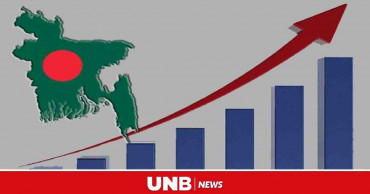world economy
UN predicts world economic growth at subdued 2.8% in 2025
The world economy resisted battering by conflicts and inflation last year and is expected to grow a subdued 2.8% in 2025, the United Nations said Thursday.
In “World Economic Situation and Prospects 2025,” U.N. economists wrote that their positive prediction was driven by the strong although slowing growth forecast for China and the United States and by the robust performances anticipated for India and Indonesia. The European Union, Japan, and United Kingdom are expected to experience modest recovery, the report says.
“We are in a period of stable, subpar growth,” said Shantanu Mukherjee, chief of the Global Economic Monitoring Branch at the Economic Analysis and Policy Division at the U.N.'s Department of Economic and Social Affairs.
“This may sound a bit like what we were saying last year, but actually if you lift the hood and take a peek at the engine things are humming,” he said.
The report says the U.S. economy outperformed expectations last year thanks to consumer and public-sector spending, but growth is expected to slow from 2.8% to 1.9% this year.
The report points out that China sees its own strong growth slowing slightly from 4.9% in 2024 to 4.8% in 2025 due to lower consumption and property-sector weaknesses that are failing to make up for public investment and export strength. This is forcing the government to enact policies to lift property markets, fight local government debt and boost demand.
Read: ADB, WTO strengthen collaboration for sustainable economic growth in Asia-Pacific region
China's “shrinking population and rising trade and technology tensions, if unaddressed, could undermine medium-term growth prospects,” the report reads.
The U.N. projected last January that 2024 global economic growth would be 2.4%. It said Thursday that the rate was estimated to have been higher, at 2.8%.
Both remain below the 3% rate that the world saw before the COVID-19 pandemic started in 2020.
European growth this year is projected to gradually pick up after a weaker than expected performance in 2024. Japan is poised to pick up from periods of near-recession and recession. India is expected to drive a strong outlook for South Asia, with regional growth projected at 5.7% in 2025 and 6% in 2026.
India's 6.6% growth forecast for 2025 is backed by solid private consumption and investment growth, the report says.
“The global reduction of poverty over the past 30 years has been driven by strong economic performance. This has been especially true in Asia, where rapid economic growth and structural transformation have allowed countries such as China, India, and Indonesia to achieve poverty alleviation unprecedented in scale and scope,” the report says.
Read mor: Japan reaffirms commitment to support Bangladesh’s reform agenda and economic growth
“The world economy has largely avoided a broad-based contraction despite the unprecedented shocks of the last few years and the most prolonged period of monetary tightening in history,” said Li Junhua, director, of the Economic Analysis and Policy Division at the Department of Economic and Social Affairs.
However, he cautioned, “the recovery remains driven primarily by a few large economies.”
1 year ago
IMF further downgrades projections for world economy in 2023
Two principal economists painted very different pictures Thursday of what the global economy will look like in the coming years.
Kristalina Georgieva, managing director of the International Monetary Fund, told an audience at Georgetown University on Thursday that the IMF is once again lowering its projections for global economic growth in 2023, projecting world economic growth lower by $4 trillion through 2026.
“Things are more likely to get worse before it gets better,” she said, adding that the Russian invasion of Ukraine that began in February has dramatically changed the IMF’s outlook on the economy. “The risks of recession are rising,” she said, calling the current economic environment a “period of historic fragility.”
Meanwhile, U.S. Treasury Secretary Janet Yellen, on the other side of town at the Center for Global Development, focused on how the U.S. and its allies could contribute to making longer-term investments to the global economy.
She called for ambitious policy solutions and didn’t use the word “recession” once. But despite Yellen’s more measured view, she said “the global economy faces significant uncertainty.”
The war in Ukraine has driven up food and energy prices globally — in some places exponentially — with Russia, a key global energy and fertilizer supplier, sharply escalating the conflict and exposing the vulnerabilities to the global food and energy supply.
Additionally, the ongoing COVID-19 pandemic, rising inflation and worsening climate conditions are also impacting world economies and exacerbating other crises, like high debt levels held by lower-income countries.
Read: Lending decision on Bangladesh in October: IMF
Georgieva said the IMF estimates that countries making up one-third of the world economy will see at least two consecutive quarters of economic contraction this or next year and added that the institution downgraded its global growth projections already three times. It now expects 3.2% for 2022 and now 2.9% for 2023.
The bleak IMF projections come as central banks around the world raise interest rates in hopes of taming rising inflation. The U.S. Federal Reserve has been the most aggressive in using interest rate hikes as an inflation-cooling tool, and central banks from Asia to England have begun to raise rates this week.
Georgieva said “tightening monetary policy too much and too fast — and doing so in a synchronized manner across countries — could push many economies into prolonged recession.” Maurice Obstfeld, an economist at the University of California, Berkeley, recently wrote that too much tightening by the Federal Reserve could “drive the world economy into an unnecessarily harsh contraction.”
Yellen agreed Thursday that “macroeconomic tightening in advanced countries can have international spillovers.”
The two economists’ speeches come ahead of annual meetings next week of the 190-nation IMF and its sister-lending agency, the World Bank, which intend to address the multitude of risks to the global economy.
Georgieva said the updated World Economic Outlook of the fund set to be released next week downgrades growth figures for next year.
Many countries are already seeing major impacts of the invasion of Ukraine on their economies, and the IMF’s grim projections are in line with other forecasts for declines in growth.
Read: IMF loan would help economy gain stability in reserves, dollar market: Experts
The Organization for Economic Cooperation and Development last week said the global economy is set to lose $2.8 trillion in output in 2023 because of the war.
The projections come after the OPEC+ alliance of oil-exporting countries decided Wednesday to sharply cut production to support sagging oil prices in a move that could deal the struggling global economy another blow and raise politically sensitive pump prices for U.S. drivers just ahead of key national elections in November.
Yellen said since many developing countries are facing all challenges simultaneously, from debt to hunger to exploding costs, “this is no time for us to retreat.”
“We need ambition in updating our vision for development financing and delivery. And we need ambition in meeting our global challenges,” she said.
3 years ago
Get ready as major shift taking place in global economy: FM
Foreign Minister Dr AK Abdul Momen has laid emphasis on getting prepared with skills, education and infrastructure as a major shift is taking place in the world economy.
"To gain from this change, we’ve to prepare ourselves with skills, education, infrastructure, good governance, and above all goodwill," Dr Momen said.
He laid emphasis on working together in partnership and need to be fully prepared to overcome the challenges and to grip the opportunities ahead.
Read:Quarantine in KSA: Saudi expatriate workers to get Tk 25000 each as subsidy
"I’m confident that through our collective efforts, strong coordination and hard work, we’ll be able to turn Bangladesh into ‘Sonar Bangla’ as dreamt by Bangabandhu Sheikh Mujibur Rahman, the Father of the Nation," Dr Momen said.
He was addressing a virtual programme titled "Perspective Plan 2041 and Quest for Development: Golden Bengal as a Label for Nation Branding" held on Thursday night.
Bangladesh Ambassador to Saudi Arabia Dr Md Javed Patwari and Dr Kamal Abdul Naser Chowdhury also spoke at the event.
4 years ago
World Bank lifts global growth outlook to 5.6% on US, China rebounds
The World Bank on Tuesday forecast global growth for this year at 5.6 percent, up 1.5 percentage points from its estimate in January as the United States and China showed robust rebounds from the coronavirus pandemic-induced downturn.
The Washington-based lender also revised up Japan's growth for this year by 0.4 point to 2.9 percent on the back of fiscal support measures, but noted that the economic benefits from this summer's Tokyo Olympics will be limited due to the absence of foreign spectators.
While emphasizing that this year's global growth outlook will mark the strongest recovery from any of the global recessions in the past 80 years, the World Bank warned in its semiannual Global Economic Prospects report that the rebound is "highly uneven" amid "highly unequal" coronavirus vaccine access.
Also read: China among top 10 improvers in business climate 2nd year in a row: World Bank
"Growth is concentrated in a few major economies, with most emerging market and developing economies lagging behind," the report said.
While about 90 percent of advanced economies are expected to regain their pre-pandemic per capita income levels by 2022, only about one-third of emerging market and developing economies are expected to do so, it added.
Global growth, which is estimated to have contracted 3.5 percent last year due to the pandemic, is projected to rise to 4.3 percent next year, a 0.5 point upgrade from the earlier estimate.
Also read: Emerging, developing economies less prepared for downturn than 10 years ago: World Bank
Among major economies, U.S. growth is expected to reach 6.8 percent this year, its fastest pace since 1984, owing to large-scale fiscal support, mass vaccination efforts and an ongoing easing of pandemic restrictions, according to the World Bank.
In March, U.S. President Joe Biden signed into law a $1.9 trillion stimulus bill, bringing the total fiscal support provided since the beginning of the pandemic last year to over one-quarter of the gross domestic product, it said.
But U.S. growth next year will soften to 4.2 percent amid diminishing fiscal support.
Japan's growth is expected to moderate to 2.6 percent in 2022, held back by lingering weakness in consumption amid subdued wage growth, the report said.
Also read: World Bank prediction on Bangladesh economy inconsistent: Finance Minister
China, after expanding 2.3 percent in 2020, is expected to see its growth jump to 8.5 percent in 2021, an upward revision of 0.6 point on expectations of stronger foreign demand. Its growth is expected to slow to 5.4 percent in 2022.
The eurozone economy is believed to grow 4.2 percent and 4.4 percent in 2021 and 2022, respectively.
Global trade is forecast to grow 8.3 percent this year after plunging by the same percentage a year earlier.
4 years ago
Govt in comfortable spending position after economy averts crashing during pandemic
With the world economy stricken by the economic crisis brought on by the Covid-19 pandemic, the Bangladeshi economic engine has shown itself to be rather resilient in facing down the crisis and keeping the wheels of the economy turning.
5 years ago
UN forecasts 4.7% global economic growth in 2021
The United Nations warned Monday that the world economy is “on a cliffhanger,” still reeling from the COVID-19 pandemic whose impact will be felt for years but still expected to make a modest recovery of 4.7% in 2021 which would barely offset 2020 losses.
5 years ago
FDI down 42pc globally in 2020; UNCTAD expects further weakness in 2021
Global foreign direct investment collapsed in 2020, falling by 42% to an estimated $859 billion from $1.5 trillion in 2019.
5 years ago
Glimmers of hope for world economy, but dangers lurk
Vendors broke out in applause in the flagship Galeries Lafayette department store in Paris as eager shoppers returned for the first time in a month, after yet another virus lockdown.
5 years ago
Air Canada lays off 5,000, France tries to save food supply
The rapid spread of the coronavirus since it was first reported in China has dealt an unparalleled shock to the world economy.
5 years ago
What's Happening: Virus hurts handshakes, elections, Louvre
The new virus is entering new territories, from megacities to seaside villages, and casting a fast-growing shadow over the world economy. Here's a look at some of the latest developments:
6 years ago






.jpg)
.jpg)
.jpg)
.jpg)




